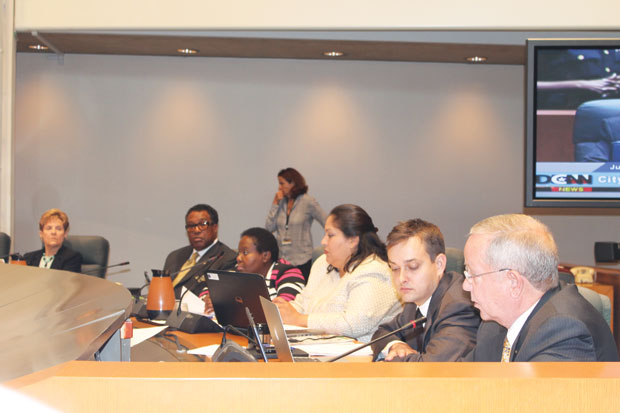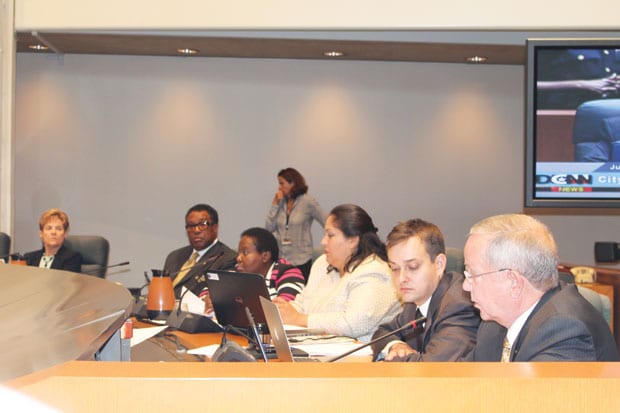Councilman Allen will use committee briefings to educate council on LGBT issues, gain broader support before resolution reintroduced

NEW STRATEGY | Councilman Jerry Allen, far right, addresses the LGBT community about the equality resolution in June. Allen is pushing for education on LGBT issues in his committee before the resolution comes back up. (Anna Waugh/Dallas Voice)
CLICK HERE TO READ THE RESOLUTION
It’s been six months since Dallas City Council took up marriage equality and workplace protections, but councilmembers are bringing the issues back before the horseshoe with a plan to educate and gain support.
A resolution supporting marriage equality and workplace protections failed to go on the council’s agenda in June when former Councilwoman Delia Jasso pulled her signature from a memo, which forced it to be added to the agenda. But even without the item up for consideration during Pride Month, LGBT activists and allies showed up in force to tell the council what they thought about the resolution failing to go before them.
Councilman Jerry Allen said he wanted to see the item come to the Budget, Finance and Audit Committee, which he chairs. That process began in December when two openly gay employees, Theresa O’Donnell and John Rogers, gave a presentation on LGBT equality, including marriage equality. Briefings will take place again on Jan. 6 and in February.
Allen recently spoke to Dallas Voice about his plan to educate the council after the falling out at City Hall back in June, when tempers flared on both sides of the aisle and audience members even walked out of the meeting.
“The intent on this thing was to basically just start to have kind of a conversation around softening kind of the rhetoric that was out there,” Allen said.
He wants the council to learn about the statewide and national landscape regarding LGBT issues. From there, he’d like to see a resolution that’s a “broad national statement” in support of LGBT equality to go before the council sometime in the summer and then have the marriage equality and workplace protections resolution to come before the council in the fall, when the council will be setting its legislative agenda for the 2015 legislative session in Austin.
Some advocates wanted to see the resolution go back before the council in the fall in order to see it pass, but Allen said passing it now would simply end the conversation he wants councilmembers to have at City Hall.
“Once you pass it, you just ended the conversation,” he said. “The marriage resolution at this stage in the game is not going to accomplish anything. Austin’s not going to do anything. You need to control that conversation as long as you can to control the conversation.”
Besides, Allen said the resolution already has the votes to pass.
“The marriage resolution will pass,” he said. “There’ll be enough votes for that. It will pass. But the key to the thing is how we get it passed.”
Councilmembers who have voiced support for the measure are Allen, Scott Griggs, the original author, Adam Medrano, Dwaine Caraway, Monica Alonzo, Carolyn Davis, Sandy Greyson and Philip Kingston.
Councilman Sheffie Kadane spoke out against the resolution for religious reasons, and Councilwoman Vonciel Hill is likely against the resolution based on her previous comments regarding LGBT issues. Councilmembers Rich Callahan and Jennifer Staubach Gates also are likely opposed to the resolution. Callahan said he was against gay marriage but not gay unions where partners receive benefits, according to a Dallas Voice candidate questionnaire. Gates answered the same question that she was against measures that didn’t correspond to city policy.
Councilmembers Lee Klienman and Tennell Atkins have not expressed their views on either side.
As for Mayor Mike Rawlings, who helped derail the resolution from being added to the agenda in his absence despite being out of the country, he may support the item. He was against the discussion happening at City Hall, but later expressed support for the measure when it made the agenda, but then refused to add it once the signature was pulled.
Rawlings spokesman Sam Merten told Dallas Voice, “Rawlings’ thoughts about the proposed resolution have not changed.” When asked if that means the mayor would vote in favor of the resolution if it goes before the council, Merten said, “We don’t engage much in hypotheticals. If, in fact, the resolution is set for Council vote, the Mayor will have an answer.”
Since June, the city’s LGBT Task Force, chaired by Medrano, has been working on a list of items to work on in the coming year, including the resolution, transgender healthcare and items for the city’s legislative agenda. Medrano said a subcommittee was put together to rewrite the resolution because members wanted to be prepared for the December committee briefing in case the resolution was addressed.
While he wants to see the resolution move forward in time, he said the Task Force’s main goal is “to work on issues that are really going to affect people in the community, to affect their lives daily.”
“The resolution is important,” Medrano added. “To us it’s more symbolic than anything else. So we kind of put it on the backburner.”
A new draft of the resolution is the one the Task Force is planning on moving forward with eventually. John Rogers, assistant city attorney, wrote the resolution. Rogers and Theresa O’Donnell, an interim assistant city manager, were both asked by Allen to help with the committee briefings since they are openly gay and work at the city.
They made the initial presentation in December. But while they are educating the council on LGBT issues, Rogers said they are not advocating or lobbying for change. They are sharing their research and experience as city employees.
“We’ve had a life experience that has taught us of the impediments of not having equal civil rights,” O’Donnell added.
Rogers said the city has a history of treating its gay employees fairly. But he used the example of pensions as an area that’s unequal. City employees get 10 years of benefits when they retire. But if they die, opposite-sex spouses get benefits for life, whereas same-sex spouses are treated like any other beneficiary.
The next finance committee briefing will take place Jan. 6. Follow-up questions about the financial impact of marriage equality will be addressed, and Beverly Davis, assistant director of Dallas’ Fair Housing Office, will give a presentation on the city’s nondiscrimination ordinance. Passed in 2002, the ordinance prohibits discrimination based on sexual orientation in housing, employment and public accommodations. Gender identity is included in the ordinance’s definition of sexual orientation.
O’Donnell and Rogers are working with the Human Rights Campaign to have a representative come and speak at the wrap-up briefing in February. They also hope to have HRC help the city with its broader resolution. She said she’d like to see the city have a national resolution like the National League of Cities resolution passed last summer that was a statement “affirming the freedom to marry and federal non-discrimination for gay and lesbian couples.”
O’Donnell said seeing the showdown at City Hall last summer was hard for her as a gay city employee.
“It hurt my heart to see the struggle with that,” she said, adding that she is proud to be helping resolve the matter now. “It takes a lot of courage to talk about these things publically than handling them quietly.”
This article appeared in the Dallas Voice print edition January 3, 2014.

